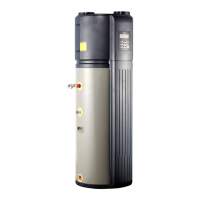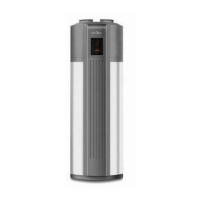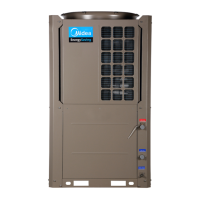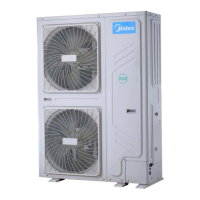MCAC-HTSM-201506 Midea R410A Direct Heating Commercial Heat Pump 50Hz Technical Manual
46
4. Fault analysis and solutions
Not distribute to malfunction
White aerosol or globule is given out.
Or make sound of ‘hiss’ every now
and then.
When the unit is defrosting, the sound of the 4-way valve
being shifted. Air supply motor stop automatically to defrost.
At the beginning and the end of the defrost process, sound
is given out in motor valve occur.
During the process or just after have stopped, sound likes
water flow occurs, which will be amplified at the first 2~3
minutes, this is caused by process of refrigerant current or
water discharge at dehumidifying operation.
Slight ‘hiss’ is caused by heat exchanger as temperature
changes. The sound gives out, because of heat expands
and cold contracts of heat exchanger.
During the beginning or just after have stopped, sound likes
clock occur, which is caused by electric expanding valve
operation.
Water outlet temperature fluctuation.
Because of different water inlet pressure, under special
working condition that may show up water outlet
temperature fluctuation, which is a normal phenomenon,
and will not affect the actual use; appropriately adjust the
water pressure can improve this phenomenon.
Water outlet temperature cannot reach
the setting temperature.
Under low temperature condition, for the purpose of
protecting the unit, the water outlet temperature may not
reach the higher setting temperature, which is a normal
phenomenon.
The terminal circulating water
temperature lower than the setting
temperature
For purpose of protecting the unit, the terminal circulating
water temperature cannot reach 60ºC, which is a
phenomenon, and will not affect the actual use.
Re-start after the unit stop, after 3
minutes then can be operated.
Compressor delay protection. It is a normal phenomenon.
The fan operates low speed or only
operates one fan.
When the ambient temperature is high, for protecting the
unit then the fan will shift to low speed or only operate one
fan.
Heat exchanger defrosting.
If operated in winter, for the heat exchanger surface
temperature is lower than the ambient one, and the heat
exchanger surface temperature is lower than 0ºC, the
surface will be frosted, which will affect the heat exchanging
effect, so the unit should be periodically defrosting.
During defrosting, the fan will not be operated.
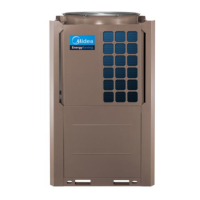
